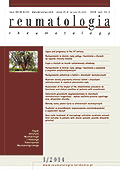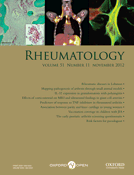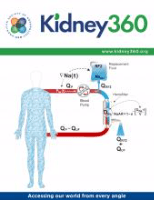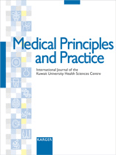
ACR Open Rheumatology
Scope & Guideline
Connecting the global rheumatology community through unrestricted access.
Introduction
Aims and Scopes
- Clinical and Translational Research:
The journal publishes studies that bridge laboratory research and clinical practice, focusing on the mechanisms of rheumatic diseases and their treatments. - Patient-Centered Outcomes:
Research highlighting patient-reported outcomes, quality of life, and treatment adherence is emphasized, showcasing the importance of patient perspectives in rheumatology. - Innovative Therapeutics and Interventions:
The journal includes studies on new drugs, biologics, and therapeutic interventions, providing insights into efficacy, safety, and practical applications. - Epidemiology and Health Disparities:
Research addressing the epidemiology of rheumatic diseases, including risk factors, comorbidities, and disparities in care, is a core focus. - Diagnostic and Imaging Advances:
The journal features studies on novel diagnostic techniques and imaging modalities that enhance the understanding and management of rheumatic conditions. - Health Services and Policy Research:
Research on healthcare delivery, policy implications, and the economic burden of rheumatic diseases is included to inform practice and improve patient care.
Trending and Emerging
- Digital Health and Telemedicine:
With the rise of telehealth, studies exploring the efficacy and patient satisfaction of remote care models have increased significantly, particularly in response to the COVID-19 pandemic. - Mental Health and Psychosocial Aspects:
There is a growing emphasis on the psychosocial dimensions of rheumatic diseases, including mental health impacts, which are increasingly recognized as crucial in patient care. - Integrative and Complementary Therapies:
Research exploring the use of complementary and integrative therapies alongside traditional treatments is on the rise, reflecting patient interest in holistic care. - Machine Learning and Data Analytics:
The application of machine learning techniques for predicting outcomes and personalizing treatments is emerging as a significant area of research. - Health Disparities and Social Determinants of Health:
There is an increasing focus on understanding how social determinants affect the incidence, treatment access, and outcomes for patients with rheumatic diseases. - Patient Empowerment and Shared Decision-Making:
Studies promoting patient involvement in treatment decisions and self-management strategies are gaining importance, highlighting a shift towards more patient-centered care.
Declining or Waning
- Traditional Pharmacotherapy Studies:
There has been a noticeable decline in studies focusing solely on conventional disease-modifying antirheumatic drugs (DMARDs) without the integration of newer therapies or comparative effectiveness research. - Basic Science Research:
The journal has shifted towards more clinically relevant studies, leading to a decrease in purely basic science research that does not directly relate to patient outcomes. - Single-Center Studies:
There is a trend away from publication of single-center studies, with a preference for multi-center collaborations that enhance the generalizability of findings. - Longitudinal Cohort Studies without Intervention:
While cohort studies remain important, those that do not investigate interventions or outcomes have decreased, reflecting a broader interest in actionable research. - Focus on Rare Diseases:
Research on rare rheumatic conditions, while still valuable, has seen a decrease in frequency, possibly due to the growing interest in more prevalent diseases or conditions.
Similar Journals

Dermatology Research and Practice
Innovating dermatology through open access research.Dermatology Research and Practice is a premier open access journal published by HINDAWI LTD, dedicated to advancing the field of dermatology since its establishment in 2009. With a respectable impact factor and a ranking of #42 out of 142 in the Scopus Medicine - Dermatology category, the journal stands in the 70th percentile, reflecting its influence and relevance in contemporary dermatological research. Based in Egypt, it provides a platform for groundbreaking studies that shape clinical practice and policy worldwide. The journal covers a wide range of topics within dermatology, including but not limited to clinical research, epidemiology, and patient care, making it an essential resource for researchers, healthcare professionals, and students seeking to enhance their understanding and contribute to the field. Emphasizing open access, Dermatology Research and Practice ensures that vital research findings are readily available to the global community, fostering collaboration and innovation in dermatology.

Reumatologia
Empowering healthcare through open access research.Reumatologia is a dedicated open-access journal published by TERMEDIA PUBLISHING HOUSE LTD that has been serving the global scientific community since 2005. The journal focuses on the fields of Rheumatology, Immunology, and Allergy, providing a rich platform for researchers and practitioners to share innovative findings, clinical insights, and methodologies. With its roots tracing back to the early 1960s and a steady convergence of quality content through 2024, Reumatologia has secured a place in the academic landscape, currently holding a Q4 rating in Immunology and a Q3 rating in both Immunology and Allergy and Rheumatology categories for 2023. While the journal ranks #42 out of 73 in the Medicine - Rheumatology category, its open-access model ensures that research is widely disseminated, enhancing visibility and accessibility to vital knowledge that shapes therapeutic practices. Located in Poznan, Poland, Reumatologia remains a pivotal source of credible research, fostering collaboration among academics, healthcare professionals, and students internationally.

RHEUMATOLOGY
Exploring New Horizons in Rheumatic Disease ManagementRHEUMATOLOGY, published by Oxford University Press, is a leading journal in the fields of Pharmacology and Rheumatology, recognized for its significant contribution to advancing the understanding and treatment of rheumatic diseases. With an impressive impact factor and ranking within the top quartiles for both medical pharmacology and rheumatology, this journal serves as an essential resource for researchers, clinicians, and healthcare professionals. The journal spans an extensive publication history, with contributions from 1952 to 1995 and from 1998 to 2024, reflecting its enduring commitment to disseminating high-quality research. The Open Access option allows for broader dissemination of knowledge, enhancing the visibility of groundbreaking studies. Positioned in the United Kingdom, RHEUMATOLOGY not only offers valuable insights into the latest therapeutic advancements and clinical guidelines but also fosters collaboration across disciplines, ensuring that practitioners stay at the forefront of innovation in the management of rheumatic conditions.

Advances in Rheumatology
Bridging gaps in knowledge for better patient care in rheumatology.Advances in Rheumatology is a premier open-access journal published by BMC, dedicated to advancing the field of rheumatology through high-quality, peer-reviewed research. Launched in 2018, the journal has quickly established itself within the academic community, achieving a commendable Q2 ranking in the category of Rheumatology as of 2023 and ranking #34 out of 73 in the Scopus Medicine Rheumatology listings, placing it in the 54th percentile. With a focus on innovative treatments, patient care, and the latest in rheumatological research, the journal provides a platform for researchers and clinicians to disseminate their findings and foster collaborative advancements in this critical area of medicine. Recognized for its accessibility, the journal follows an open-access model, ensuring that research is freely available to a global audience. With a commitment to high standards of academic rigor, Advances in Rheumatology plays a vital role in enhancing the understanding and treatment of rheumatic diseases, making it an invaluable resource for researchers, professionals, and students alike.

Kidney360
Redefining nephrology through open-access knowledge.Kidney360 (ISSN: 2641-7650) is a prominent open-access journal published by the American Society of Nephrology, dedicated to advancing the field of nephrology and its intersecting medical disciplines. Established with a vision to foster innovative research and promote a deeper understanding of kidney health, this journal is positioned as a vital resource for nephrologists, researchers, and healthcare professionals. With its classification in Q1 in Nephrology and Q2 in Medicine (miscellaneous) for 2023, Kidney360 ranks favorably, highlighting its commitment to publish high-quality, impactful research, recognized in the top percentile of its field. The journal's accessible platform aims to disseminate knowledge effectively, making it an essential repository for cutting-edge studies, reviews, and clinical research. By encouraging collaboration across various disciplines, Kidney360 plays a critical role in shaping the future of nephrology and enhancing patient care on a global scale.

MEDICAL PRINCIPLES AND PRACTICE
Elevating standards in medical education and practice.Medical Principles and Practice is a renowned journal within the field of health sciences, disseminating cutting-edge research and insights since its inception in 1989. Published by Karger in Switzerland, this Open Access journal has committed itself to making valuable medical knowledge freely accessible to the global research community since 2013. With an impressive impact factor and ranked in the Q2 category of Medicine (miscellaneous) for 2023, it holds a prestigious position, currently occupying the 70th rank out of 636 in the Scopus category of General Medicine, placing it in the 89th percentile overall. The journal’s dedication to merging theoretical principles with practical applications makes it a critical resource for researchers, healthcare professionals, and students aiming to enhance their understanding and application of medical knowledge. Published in Basel, Switzerland, this journal paves the way for pioneering discussions and advancements in medical practice, ensuring that its audience remains at the forefront of the rapidly evolving healthcare landscape.

Current Rheumatology Reports
Leading the way in rheumatological discoveries.Current Rheumatology Reports is a premier journal dedicated to advancing the field of rheumatology, published by Springer. With an esteemed Q1 category ranking in Rheumatology as of 2023 and a remarkable Scopus rank of 6 out of 73, this journal stands at the forefront of research dissemination, boasting an impressive percentile ranking in the 92nd. Since its inception in 1999, Current Rheumatology Reports has provided a critical platform for the latest findings in rheumatological diseases, treatment strategies, and clinical practices. Although it currently does not offer Open Access options, the journal's rigorous peer-review process ensures high-quality publications that are essential for researchers, clinicians, and students alike. By keeping the community informed of key developments, this journal plays a vital role in shaping contemporary rheumatological research and practice, thereby facilitating the advancement of patient care worldwide.

Acta Reumatologica Portuguesa
Connecting professionals to groundbreaking rheumatic research.Acta Reumatologica Portuguesa is a premier open access journal dedicated to the field of rheumatology and general medicine, published by PUBLISAUDE-EDICOES MEDICAS LDA since its inception in 1973. Situated in Portugal, this journal aims to disseminate high-quality research findings, clinical studies, and reviews that contribute to the understanding and management of rheumatic diseases. Despite its current Q4 ranking in both Medicine (miscellaneous) and Rheumatology, it serves as a vital platform for researchers and professionals aiming to share innovative insights and clinical practices within a rapidly evolving field. Researchers and medical professionals will find valuable information that can significantly influence their work, given the journal’s commitment to accessible knowledge through its open access model. By prioritizing collaboration and knowledge-sharing, Acta Reumatologica Portuguesa continues to engage with issues of critical relevance in rheumatology, appealing to a diverse audience of scholars and healthcare practitioners.

RHEUMATOLOGY INTERNATIONAL
Exploring the forefront of rheumatology research.Rheumatology International, published by Springer Heidelberg, is a prestigious journal that focuses on innovative research in the field of rheumatology and immunology. Established in 1981, this peer-reviewed journal has contributed significantly to advancing our understanding of autoimmune disorders, clinical approaches, and therapeutic interventions. It holds a commendable Q2 ranking in the categories of Immunology, Immunology and Allergy, and Rheumatology as of 2023, showcasing its influence and importance within these disciplines. With a robust Scopus ranking—positioned 14 out of 73 in Medicine Rheumatology—it caters to a diverse audience of researchers, clinicians, and students committed to improving patient care and treatment modalities. Although it does not currently offer open access options, the journal remains a vital resource for insights on contemporary challenges and breakthroughs in rheumatological research, published from its base in Heidelberg, Germany.

Open Access Rheumatology-Research and Reviews
Exploring Innovations in Musculoskeletal and Autoimmune Disorders.Open Access Rheumatology-Research and Reviews, published by DOVE MEDICAL PRESS LTD, is a distinguished journal that has been a vital part of the rheumatology field since its inception in 2009. With an ISSN of 1179-156X, this journal is dedicated to disseminating groundbreaking research and comprehensive reviews in the discipline of rheumatology, making it an essential resource for researchers, clinicians, and students alike. It boasts an impressive Q3 ranking in the Rheumatology category for 2023, reflecting its relevance and quality within a highly competitive landscape, where it ranks in the 51st percentile among its peers as indicated by the Scopus Ranks. As an open-access platform, it ensures that critical findings and insights are easily accessible to a global audience, promoting collaboration and knowledge sharing. The journal's scope includes a wide range of topics within rheumatology, aimed at advancing understanding and treatment of musculoskeletal disorders and autoimmune diseases. Its headquarters is located in New Zealand, positioning it as a key player in the international research community.